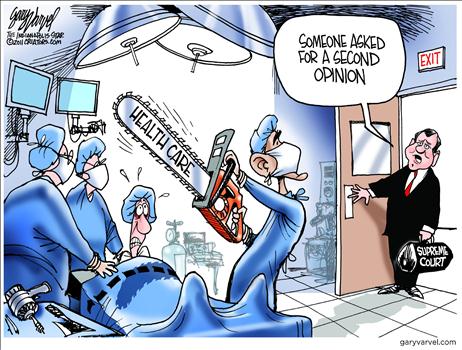Twenty-six states, led by my own Florida, have challenged the constitutionality of Obamacare. The court challenge has now risen to the Supreme Court level, and we learned last week that the Supreme Court has decided to hear the case. Although I consider the entire law to be unconstitutional, the Court may focus on the fact that it forces people to buy health insurance. If that provision is allowed to stand, it will be the first time that the federal government has mandated that people buy a product; they no longer will have a choice. How would we feel if the federal government mandated we buy only decaffeinated coffee, for instance, because it has concluded, in its wisdom, that everyone would benefit from drinking it?
Far-fetched? Not if the precedent is set via Obamacare. That’s why so many states have become party to this lawsuit. We can even use a common medical term to describe this court challenge:
While I pray—and I mean that literally—that the Court overturns this awful law, the fact that we have to await the verdict of nine people to decide the fate of the union is sad in itself. The Constitution set up three equal branches of government, designed to check and balance each other. Yet we seem happy to allow just one branch to determine the appropriateness of a law. Every time the Supreme Court makes a pronouncement, we accept it as the final word. That means a very divided 5-4 vote can set the course for the direction of the entire nation.
What if the Supreme Court backs Obamacare? What is to be done? Constitutionally, it can be treated the same as the infamous Dred Scott decision of 1857, which concluded that no black person, free or slave, was a citizen of the United States. At that time, the Republican Party stood against the decision and worked to undo it. I hope the current manifestation of the Republican Party would do the same today.

